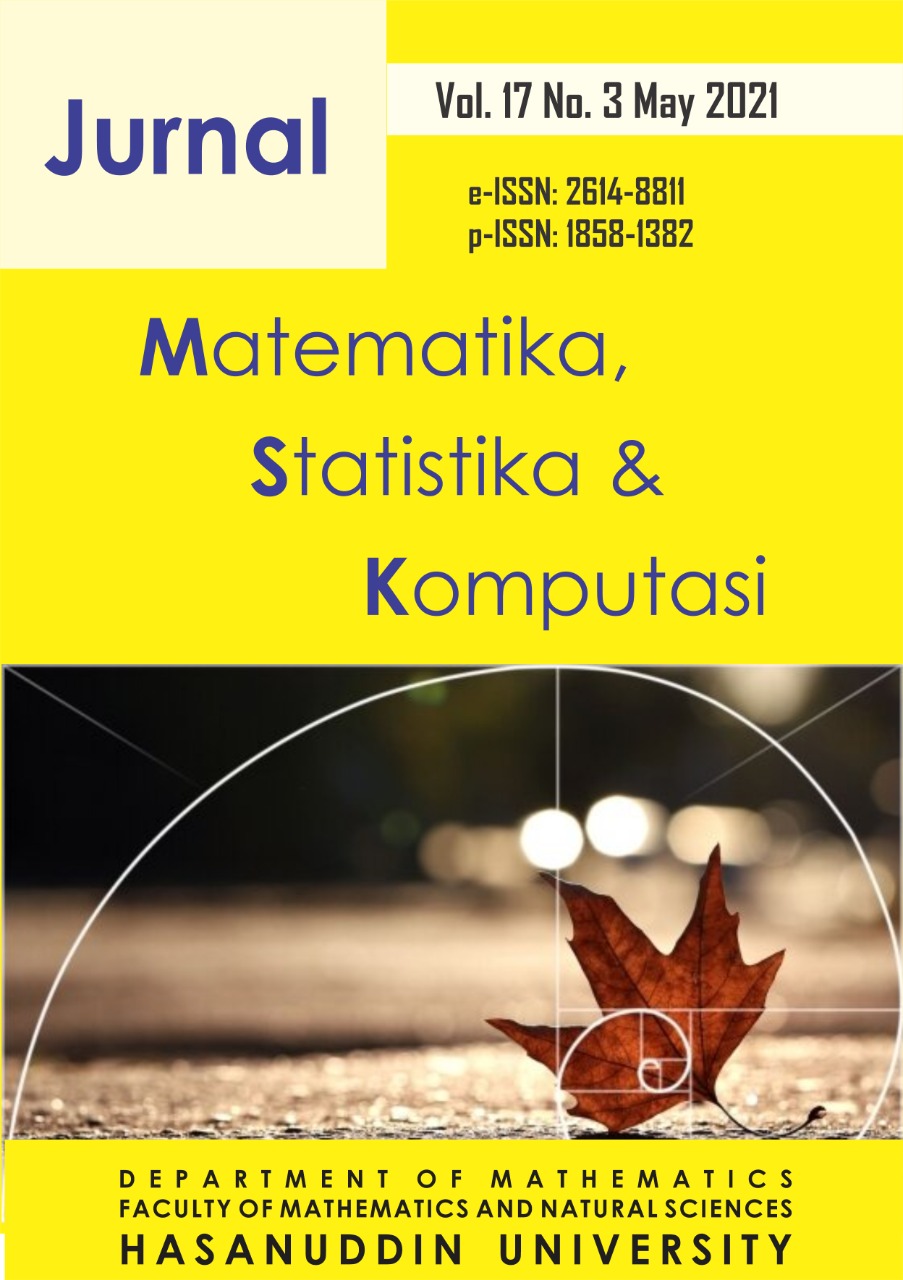Spatial Area Model for Covid-19 in Java Based on R-Shiny Web Framework
DOI:
https://doi.org/10.20956/j.v17i3.11743Keywords:
Covid-1, Spatial Area ModeAbstract
The Covid-19 in Indonesia has had an impact on almost all lives, especially at economic, social, education, and health.. Efforts to prevent and reduce the number of cases are still ongoing. Likewise, research on the causes of the emergence of the Covid-19 pandemic outbreak, drugs, vaccines, and the factors that influence it are still being carried out. This study analyzes the effect of Covid-19 on inflation and the effect of population density on Covid-19 in Java. The method used is area spatial modeling. To make it easier for researchers to analyze data, this study also developed a web application based on the R shiny framework. This application has displayed valid output from the results of its use and is in accordance with existing theories, and is able to make it easier for users to carry out Covid-19 analysis in Java using the area spatial model method. The estimation results of the Spatial Durbin Model (SDM) show that the variable that has a significant effect on inflation is the inflation lag in the model with cumulative positive cases (α = 10%). This shows that the inflation of a province tends to be influenced by other neighboring provinces. Meanwhile, population density is also significant for Covid-19 positive cases (α = 5%).
References
Abdi, M. N., 2020. Krisis Ekonomi Global dari Dampak Penyebaran Virus Corona (Covid-19), AkMen Jurnal Ilmiah, Vol.17(1), 711-719.
Aminul, M., 2020. Perilaku Produksi di Tengah Krisis Global Akibat Pandemi Covid-19 dan Memanfaatkan Media Online Facebook Sebagai Alternatif Pasar. http://eprints.umsida.ac.id/6834/. [10 Oktober 2020]
Anselin, L., 1988. Spatial Econometrics: Methods and Models, Ist Edn. Kluwer Academic Publishers, Netherlands.
Bekti, R. D., & Irwansyah, E., 2014. Mapping of Illiteracy and Information and Communication Technology Indicators using Geographically Weighted Regression, Journal of Mathematics and Statistics, Vol 10, No. 2, 130-138.
Bekti, R. D., Nurhadiyanti, G., & Irwansyah, E., 2014. Spatial pattern of diarrhea based on regional economic and environment by spatial autoregressive model. AIP Conference Proceedings,Vol. 1621, No. 1, 454-461. American Institute of Physics.
Bekti, R. D. Sutikno., 2012. Spatial Durbin Model to Identify Influential Factors of Diarrhea. J. Math. Statistics, Vol. 8, 396-402.
Briz-Redón, Á., 2019. SpNetPrep: An R Package using Shiny to Facilitate Spatial Statistics on Road Networks. Research Ideas and Outcomes, Vol. 5, e33521.
Danon, L., Brooks-Pollock, E., Bailey, M., & Keeling, M. J., 2020. A spatial model of CoVID-19 transmission in England and Wales: early spread and peak timing. medRxiv.
Gibranda, F. R., & Aknuranda, I., 2017. Pengembangan WebGIS Untuk Analisis Dan Pemodelan Data Menggunakan Teknik Regresi Spasial dan R-Shiny Web Framework (Studi Kasus: Data Kemiskinan dan Zakat Jawa Timur). Jurnal Pengembangan Teknologi Informasi dan Ilmu Komputer, Vol.2, No. 3, 1290-1298.
Giuliani, D., Dickson, M. M., Espa, G., & Santi, F., 2020. Modelling and predicting the spatio-temporal spread of Coronavirus disease 2019 (COVID-19) in Italy, https://arxiv.org/pdf/2003.06664.pdf. [1 Oktober 2020]
Kraemer, M. U., Yang, C.-H., Gutierrez, B., Wu, C.-H., Klein, B., Pigott, D. M., Hanage, W. P., 2020. The effect of human mobility and control measures on the COVID-19 epidemic in China. Science. No. 6490, 493-497
Moraga, P., 2017. SpatialEpiApp: a Shiny web application for the analysis of spatial and spatio-temporal disease data. Spatial and spatio-temporal epidemiology, Vol. 23, 47-57.
Rosary, D., Setyawan, Y., dan Bekti, R.D., 2020. Perbandingan Metode K-Nearest Neighbour dan Naive Bayes Classification Untuk Membentuk Sistem Rekomendasi Berita Olahraga Online Berbasis Web Application. Skripsi. IST AKPRIND Yogyakarta.
Setkab RI., 2020. Pemerintah Berikan 6 Program Bantuan Tambahan Hadapi Pandemi Covid-19.https://setkab.go.id/pemerintah-berikan-6-program-bantuan-tambahan-hadapi-pandemi-covid-19/.[1 Oktober 2020]
Setyawan, Y., Bekti, RD., Isarlin, F., 2020. Application of SKATER and Ward's methods in grouping Indonesian provinces based on monthly expenditure per capita of food commodity groups. IOP Conference Series: Materials Science and Engineering. Vol 807. 1 Maret 2020.
Longley, P. A., & Batty, M. (Eds.)., 1997. Spatial analysis: modelling in a GIS environment. John Wiley & Sons., New York
Tanty, H., Bekti, D. R., & Irwansyah, E., 2014. Package Plgun-In R Untuk Pemetaan Autokorelasi Spasial Pada Kualitas Air. Prosiding Seminar Nasional Aplikasi Sains & Teknologi (SNAST), 269-274. IST AKPRIND Yogyakarta.
Team, R. C. 2013. R: A language and environment for statistical computing. http://cran.univ-paris1.fr/web/packages/dplR/vignettes/intro-dplR.pdf. [1 Maret 2020].
VOA. 2020. Menkeu: Dampak Covid-19, Pertumbuhan Ekonomi Indonesia 2020 bisa Minus 0,4 persen. https://www.voaindonesia.com/a/menkeu-dampak-covid-19-pertumbuhan-ekonomi-indonesia-2020-bisa-minus-0-4-persen/5355838.html. [1 Oktober 2020].
Downloads
Published
How to Cite
Issue
Section
License
Copyright (c) 2021 Author and publisher

This work is licensed under a Creative Commons Attribution 4.0 International License.

This work is licensed under a Creative Commons Attribution 4.0 International License.
Jurnal Matematika, Statistika dan Komputasi is an Open Access journal, all articles are distributed under the terms of the Creative Commons Attribution License, allowing third parties to copy and redistribute the material in any medium or format, transform, and build upon the material, provided the original work is properly cited and states its license. This license allows authors and readers to use all articles, data sets, graphics and appendices in data mining applications, search engines, web sites, blogs and other platforms by providing appropriate reference.







